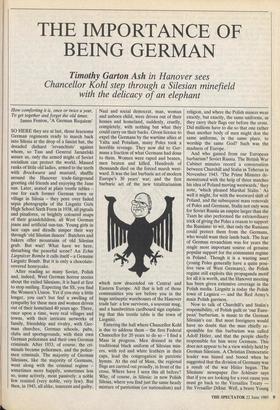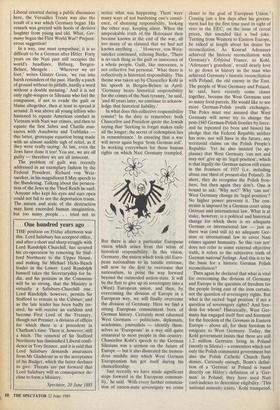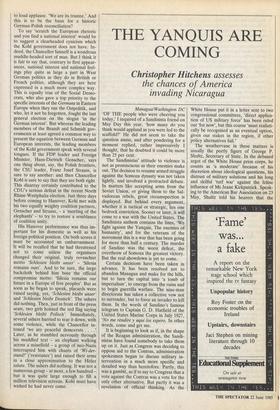THE IMPORTANCE OF BEING GERMAN
Timothy Garton Ash in Hanover sees
Chancellor Kohl step through a Silesian minefield with the delicacy of an elephant
How comforting it is, once or twice a year, To get together and forget the old times. James Fenton, 'A German Requiem' SO HERE they are at last, those fearsome German regiments ready to march back into Silesia at the drop of a fascist hat, the dreaded diehard `revanchists' against whom, so Tass and General Jaruzelski assure us, only the armed might of Soviet socialism can protect the world. Massed ranks of little old ladies, armed to the teeth with Brockwurst and mustard, shuffle around the Hanover trade-fairground greeting old friends and enjoying the June sun. Later, seated at plain trestle tables –, one for each former German town or village in Silesia – they pore over faded sepia photographs of the Liegnitz Girls High School Sixth Form in 1938, all pigtails and pinafores, or brightly coloured snaps of their grandchildren, all West German jeans and artificial sun-tan. Young girls in lace caps and dirndls simper their way through 'old Silesian dances'. Butchers and bakers offer mountains of old Silesian grub. But wait! What have we here, disturbing the peaceful scene? An Echte Liegnitzer Bombe it calls itself – a Genuine Liegnitz Bomb. But it is only a chocolate- covered honeycake.
After reading so many Soviet, Polish and, indeed, West German horror stories about the exiled Silesians, it is hard at first to stop smiling. Expecting the SS, you find the Women's Union. Yet if you stay a little longer, you can't but feel a swelling of sympathy for these men and women driven out of their homeland 40 years ago. There, once upon a time, were real villages and towns, with their intricate networks of family, friendship and rivalry, with Ger- man churches, German schools, pubs, clubs and sportsgrounds, with their own German policemen and their own German criminals. After 1933, of course, the cri- minals became policemen, and the police- men criminals. The majority of German Silesians, like the majority of Germans, went along with the criminal regime sometimes more happily, sometimes less so, some actively, most passively: a noble few resisted (very noble, very few). But then, in 1945, all alike, innocent and guilty, Nazi and social democrat, man, woman and unborn child, were driven out of their homes and homeland, suddenly, cruelly, completely, with nothing but what they could carry on their backs. Given licence to expel the Germans by the wartime allies at Yalta and Potsdam, many Poles took a horrible revenge. They now did to Ger- mans a fraction of what Germans had done to them. Women were raped and beaten, men beaten and killed. Hundreds of thousands died on the forced march west- ward. It was the last barbaric act of modern Europe's 30 years' war; and the first barbaric act of the new totalitarianism which now descended on Central and Eastern Europe. All that is left of those communities you see before you in the huge antiseptic warehouses of the Hanover trade fair: a few survivors, a souvenir mug, and a handwritten cardboard sign explain- ing that this trestle table is the town of Liegnitz.
Entering the hall where Chancellor Kohl is due to address them – the first Federal Chancellor for 20 years to do so – I find a Mass in progress. Men dressed in the traditional black uniform of Silesian min- ers, with red and white feathers in their caps, lead the congregation in patriotic hymns. At the end of Mass, the regional flags are carried out proudly, in front of the cross. Where have I seen this all before? Why, of course, in Silesia: in now Polish Silesia, where you find just the same heady mixture of patriotism (or nationalism) and
religion, and where the Polish miners wear exactly, but exactly, the same uniforms, as they carry their flags out before the cross. Did millions have to die so that one rather than another body of men might don the same uniforms, in the same place, to worship the same God? Such was the madness of Europe.
And who gained from our European barbarism? Soviet Russia. The British War Cabinet minutes record a conversation between Churchill and Stalin in Teheran in November 1943. 'The Prime Minister de- monstrated with the help of three matches his idea of Poland moving westwards,' they note, 'which pleased Marshal Stalin.' As well it might, for with the westward shift of Poland, and the subsequent mass removals of Poles and Germans, Stalin not only won for Soviet Russia an empire larger than the Tsars he also performed the extraordinary trick of giving the Poles a reason to support the Russians: to wit, that only the Russians could protect them from the Germans, who would want their lands back. The fear of German revanchism was for years the single most important source of genuine popular support for the communist regime in Poland. Though it is a wasting asset (young Poles generally have a quite posi- tive view of West Germany), the Polish regime still exploits this propaganda motif for all it is worth, and the Hanover meeting has been given extensive coverage in the Polish media. Liegnitz is today the Polish town of Legnica — and the Red Army's main Polish garrison.
Now to talk of Churchill's and Stalin's responsibility, of Polish guilt or 'our Euro- pean' barbarism, is music to the German Silesian's ear. But most foreigners would have no doubt that the man chiefly re- sponsible for this barbarism was called Adolf Hitler, and that the people chiefly responsible for him were Germans. This does not appear to be a view widely held by German Silesians. A Christian Democratic leader was hissed and booed when he suggested that the division of Germany was a result of the war Hitler began. The Silesians' newspaper Der Schlesier says that if you are looking for a root cause you must go back to the Versailles Treaty the Versailler Diktat. Well, a brave Young
Liberal retorted during a public discussion here, the Versailles Treaty was also the result of a war which Germany began. His remark was greeted with hoots of derisive laughter from young and old. What, Ger- many began the First World War? Prepost- erous suggestion!
In a way, one must sympathise, it is so difficult to be a German after Hitler. Forty years on the Nazi past still occupies the world's headlines, Bitburg, Bergen- Belsen, Mengele . . 'Wherever we set foot,' writes Giinter Grass, 'we run into harsh reminders of the past. Hardly a patch of ground without its pitfalls, hardly a word without a double meaning.' And it is not only right-wingers or Silesians who feel the compusion, if not to evade the guilt or blame altogether, then at least to spread it around. It was above all young leftists who hastened to equate American conduct in Vietnam with Nazi war crimes, and then to equate the first Sabra and Chatila mas- sacres with Auschwitz and Treblinka this latter, grotesque equation being made with an almost audible sigh of relief, as if they were really saying: At last, even the Jews have done it too! You see, we are all guilty — therefore we are all innocent.
The problem of guilt was recently addressed in an exemplary fashion by the Federal President, Richard von Weiz- saecker, in his magnificent 8 May speech to the Bundestag. Talking 'about the persecu- tion of the Jews in the Third Reich he said: 'Anyone who kept his eyes and ears open could not fail to see the deportation trains. The nature and scale of the destruction may have exceeded human imagination, but too many people . . . tried not to notice what was happening. There were many ways of not burdening one's consci- ence, of shunning responsibility, looking the other way, keeping silent. When the unspeakable truth of the Holocaust then became known at the end of the war, all too many of us claimed that we had not known anything . . .' However, von Weiz- saecker continued, echoing Burke, 'There is no such thing as the guilt or innocence of a whole people. Guilt, like innocence, is not collective but personal.' What there is collectively is historical responsibility. This theme was taken up by Chancellor Kohl in his speech in Bergen-Belsen in April: 'Germany bears historical responsibility for the crimes of the Nazi tyranny,' he said, 'and 40 years later, we continue to acknow- ledge that historical liability.'
In what does this collective responsibility consist? In the duty to remember: both Chancellor and President quote the Jewish saying that 'Seeking to forget makes exile all the longer; the secret of redemption lies in remembrance.' In ensuring that a war will never again begin 'from German soil'. In working everywhere for those human rights on which Nazi Germany trampled.
But there is also a particular European vision which arises from this sense of historical responsibility. In this vision, Germany, the nation which took old Euro- pean nationalism to its lunatic extreme, will now be the first to overcome that nationalism, to point the way forward beyond the outmoded nation-state. It will be the first to give up its sovereignty into a (West) European union, and then, by overcoming the division of Europe in a European way, we will finally overcome the division of Germany. Here we find a strong European commitment born of German history. Certainly most educated West Germans — politicians, diplomats, academics, journalists — identify them- selves as 'Europeans' in a way still quite unnatural to most people in this country. Chancellor Kohl's speech to the German Silesians was a sermon on the future of Europe — but it also illustrated the tremen- dous muddle into which West German Europeanism has got itself during his chancellorship.
'Just recently we have made significant steps forward in the European commun- ity,' he said. 'With every further renuncia- tion of nation-state sovereignty we come closer to the goal of European Union.' Coming just a few days after his govern- ment had for the first time used its right of veto in the EEC, on the issue of cereal prices, this sounded like a bad joke. Turning from Western to Eastern Europe, he talked at length about his desire for reconciliation. As Konrad Adenauer achieved the historic reconciliation with Germany's Erbfeind France, so Kohl, 'Adenauer's grandson', would dearly love to go down in history as the man who achieved Germany's historic reconciliation with Poland, the old enemy in the East. The people of West Germany and Poland, he said, have recently come closer together, because the West Germans sent so many food parcels. He would like to see more German-Polish youth exchanges. The Poles must rest assured that West Germany will never try to change the post-1945 German-Polish frontier by force: and he repeated (to boos and hisses) his pledge that the Federal Republic neither has now, nor will have in the future, any territorial claims on the Polish People's Republic. Yet he also insisted (to ap- plause) that West Germany 'can not and may not' give up its 'legal position', which is that legally the German nation still exists in the frontiers of 1937 (i.e. including about one third of present-day Poland). In short, they do recognise the Polish fron- tiers, but then again they don't. One is bound to ask: 'Why not?' Why 'can not' West Germany change its 'legal position'? No higher power prevents it. The con- straint is imposed by a German court using German and international law. What is at stake, however, is a political and historical change for which there is no adequate German or international law — just as there was (and still is) no adequate Ger- man or international law to cover Nazi crimes against humanity. So this 'can not' does not refer to some external objective truth, it refers to the subjective truth of German national feelings. And this is to be the basis for a historic German Polish reconciliation?
Then again he declared that what is vital for overcoming the division of Germany and Europe is the question of freedom for the people living east of the iron curtain, not the question of sovereignty rights. But what is the sacred 'legal position' if not a question of sovereignty rights? And free- dom for whom? Historically, West Ger- many has engaged itself first and foremost for the freedom of the Germans in Eastern Europe – above all, for their freedom to emigrate to West Germany. Today, the Kohl government insists that there are still 1.2 million Germans living in Poland (mostly in Silesia) – a contention which not only the Polish communist government but also the Polish Catholic Church flatly denies. Curiously enough, Bonn's defini- tion of a 'German' in Poland is based directly on Hitler's definition of a 'Ger- man' in Poland; they have used Nazi card-indexes to determine eligibility. 'This national minorit3 exists,' Kohl trumpeted, to loud applause. 'We are its trustee.' And this is to be the basis for a historic German-Polish reconciliation?
To say 'scratch the European rhetoric and you find a national interest' would be to suggest a clearheaded cynicism which the Kohl government does not have. In- deed, the Chancellor himself is a wondrous muddle-headed sort of man. But I think it is fair to say that, contrary to first appear- ances, national interest and national feel- ings play quite as large a part in West German politics as they do in British or French politics, although they are here expressed in a much more complex way.
This is equally true of the Social Demo- crats, who also gave a top priority to the
specific interests of the Germans in Eastern
Europe when they ran the Ostpolitik, and who, let it not be forgotten, fought the last general election on the slogan 'in the German interest'. But whereas the leading members of the Brandt and Schmidt gov- ernments at least agreed a common way to present the equation between German and European interests, the leading members of the Kohl government speak with several tongues. If the FDP leader and Foreign Minister, Hans-Dietrich Genscher, says one thing about, say, the Polish frontiers, the CSU leader, Franz Josef Strauss, is sure to say another: and then Chancellor Kohl is sure to say that they are both right. This disarray certainly contributed to the CDU's serious defeat in the recent North Rhine-Westphalia election. Just three days before coming to Hanover, Kohl met with his two equally weighty coalition partners, Genscher and Strauss, — a 'meeting of the elephants' — to try to restore a semblance of coalition unity.
His Hanover performance was thus im- portant for his domestic as well as his foreign political position. On both scores it must be accounted an embarrassment. It will be recalled that he had threatened not to come unless the organisers changed their original, truly revanchist motto `Schlesien bleibt unser' — 'Silesia remains ours'. And to be sure, the large backcloth behind him bore the official compromise motto: 'Silesia remains our future in a Europe of free peoples'. But as soon as he began to speak, placards were raised saying, yes, 'Schlesien bleibt unser' and 'Schlesien bleibt Deutsch'. The ushers did nothing. Then, just in front of the press seats, two girls hoisted the red flag saying 'Schlesien bleibt Polisch'. Immediately, several ushers hurried to tear it down, with some violence, while the Chancellor in- toned 'we are peaceful democrats . . . Later, as he stumbled nervously through his muddled text — an elephant walking across a minefield — a group of neo-Nazis interrupted him with chants of `Wi-der- stand!' (`resistance') and raised their arms in a close approximation to the Hitler salute. The ushers did nothing. It was not a numerous group — at most, a few hundred but it was quite large enough to fill a million television screens. Kohl must have wished he had never come.
















































 Previous page
Previous page